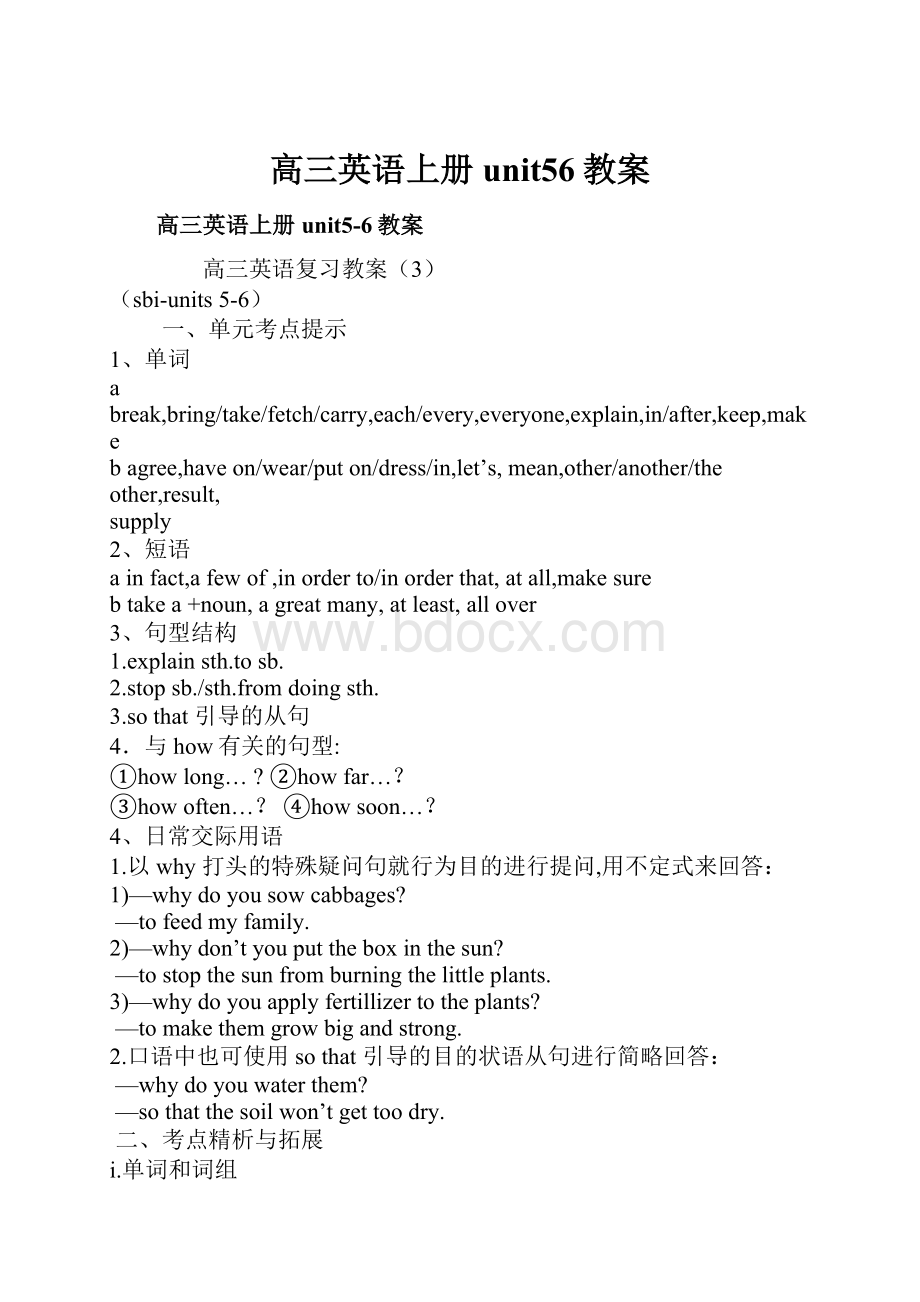高三英语上册unit56教案.docx
《高三英语上册unit56教案.docx》由会员分享,可在线阅读,更多相关《高三英语上册unit56教案.docx(10页珍藏版)》请在冰豆网上搜索。

高三英语上册unit56教案
高三英语上册unit5-6教案
高三英语复习教案(3)
(sbⅰ-units5-6)
一、单元考点提示
1、单词
abreak,bring/take/fetch/carry,each/every,everyone,explain,in/after,keep,make
bagree,haveon/wear/puton/dress/in,let’s,mean,other/another/theother,result,
supply
2、短语
ainfact,afewof,inorderto/inorderthat,atall,makesure
btakea+noun,agreatmany,atleast,allover
3、句型结构
1.explainsth.tosb.
2.stopsb./sth.fromdoingsth.
3.sothat引导的从句
4.与how有关的句型:
①howlong…?
②howfar…?
③howoften…?
④howsoon…?
4、日常交际用语
1.以why打头的特殊疑问句就行为目的进行提问,用不定式来回答:
1)—whydoyousowcabbages?
—tofeedmyfamily.
2)—whydon’tyouputtheboxinthesun?
—tostopthesunfromburningthelittleplants.
3)—whydoyouapplyfertillizertotheplants?
—tomakethemgrowbigandstrong.
2.口语中也可使用sothat引导的目的状语从句进行简略回答:
—whydoyouwaterthem?
—sothatthesoilwon’tgettoodry.
二、考点精析与拓展
i.单词和词组
1.feedvt.喂养;以……为。
常用结构:
feed…with/onsth.feedsth.to
①shefeedsherbabywith/oncow’smilk./shefeedscow’smilktoherbaby.她用牛奶喂孩子。
②ifeedmycatwith/onfish./ifeedfishtomycat.我用鱼喂猫。
另外:
feed(vi.)on相当于liveon,意为“以……为主食”。
sheepfeedmainlyongrass.羊以草为主食。
2.therest其余的人或物。
可替代可数名词复数或不可数名词。
作主语时,谓语动词数的形式应由替代的名词形式决定。
①thesethreebooksaremine.therestarehis.这三本书是我的,其余的是他的。
②justgivemeaglassofthebeer;therestisyours.给我一杯啤酒就行,其余的归你。
3.bring/take/fetch(get)/carry
①bring向着说话人的地方“带来;拿来”。
②take由说话人的地方“带走;拿去”。
③fetch(get)由说话人的地方“去拿来、带来”,指往返双程。
④carry“携带;搬运;运送”,无方向性。
4.freeadj.
(1)空闲的;有空的。
areyoufreetomorrow?
明天你有空吗?
(2)免费的;无偿的。
①doyouenjoyfreemedicalcare?
你享受免费医疗吗?
②—whyareyousohappy?
你怎么那么高兴?
—becauseigottwofreeticket.我免费弄到两张票。
(3)自由的。
①thebirdsinthecagewishtobefree.笼中之鸟盼望自由。
②youarefreetosayanythingyouwanttoatthemeeting.会上你可以畅所欲言。
5.howlong/howsoon/howfar/howoften
(1)howlong多久。
表示一段时间,句中的动词应是延续性的。
是对for或since等所表示的时间状语的提问。
共6页,当前第1页123456
—howlonghaveyoulivedhere?
你在这里住多久了?
①—forthreeyears.3年了。
②—since1997.从1997年至今。
③—sinceigraduatedfromcollege.从大学毕业至今。
(2)howsoon(将来)多久;(过)多久(以后)。
是对in所表示的时间状语的提问。
—howsooncanyoufinishthework?
多久你能完成这工作?
—inthreehours.3小时后。
(3)howfar多远。
用来提问距离。
—howfarisyourhometownfromhere?
你家乡离这里多远?
—twentykilometres.20公里。
(4)howoften(每隔)多久;多经常。
用来提问频度。
—howoftendoyouusuallygohome?
你多久回家一次?
—twiceamonth.一个月两次。
6.take/havealookat看一下。
该动词短语比lookat更侧着于一次性动作,即“看一眼”。
canitake/havealookatyournewwatch?
我看一看你新买的手表好吗?
类似的短语还有:
take/havearest/anexam/abath等。
7.puton/pullon/wear/haveon/dress/in
(1)puton和pullon穿上;戴上。
相当于及物动词,以衣物作宾语,着重于穿、戴的动作。
puton为普通用语;pullon多用于穿袜子、戴手套或比较随便地穿上。
①it’scoldoutside.you’dbetterputonyourhat.外面很冷,你最好戴上帽子。
②sheput/pulledonhercoatandwentoutoftheroomhurriedly.她穿上大衣,匆忙地走了。
(2)wear和haveon穿着;戴着。
相当于及物动词,有衣物作宾语,着重于穿、戴的状态。
haveon不用于进行时态。
①healwayswears/hasonblackshoes.她一直穿着黑鞋。
②sheiswearing/hasonaredcoat她穿着红大衣。
(3)dress穿;戴。
可用作及物动词,以人作宾语,即dresssb.(给某人穿衣);也可用作不及物动词。
既可强调动作,又可表示状态,表示状态时常用bedressedin结构。
此外dress还可用作名词。
①maryisdressingherdaughter.玛丽正给她女儿穿衣服。
②sheusuallydresseswell.她总是穿得很好。
③heisdressedinablackjacket.他穿着黑上衣。
(4)in穿着;戴着。
是介词,以衣物或表示颜色的名词作宾语,表示状态。
构成的介词短词可作表语或定语。
①mybrotherisinabluejacket.我弟弟穿着蓝上衣。
②theboyinabluejacketismybrother.穿蓝上衣的孩子是我弟弟。
③mybrotherisinblue.我弟弟穿着蓝衣服。
8.dowalking步行。
“do+动名词”结构表示“干某事,有较灵活的译法。
doreading(读书)/washing(洗衣服)/cooking(做饭)/shopping
(买东西)/cleaning(打扫除)等。
9.news:
information新闻;消息。
为不可数名词,如果表示“几条消息”,应用piece。
①thenewsistrue.这条消息是真的。
②apieceofnews一条新闻;一则消息。
twopiecesofnews两条新闻;两则消息。
severalpiecesofnews几条新闻;几则消息。
10.agree同意。
常用桔构:
(1)agreeon对……取得一致意见或达成协议。
主语必须是两者以上。
也常用被动语态,表示“(某事)是大家都同意的”。
①theyagreedonthedateforthenextmeeting.对下次会议的日期他们达成了一致意见。
②atlast,theplanwasagreedon.最后,这项计划通过了。
共6页,当前第2页123456
(2)agreeto同意;赞成。
to为介词,后接表示“建议;办法;计划”等名词。
①doyouagreetomyplan?
你同意我的计划吗?
②theheadmasterhasagreedtooursuggestionfortheholiday.校长同意了我们度假的建议。
(3)agreewith同意;赞成。
后接sb.或what从句。
iagreewithyou,butidon’tagreewithwhathesaid.我同意你的意见,但我不同意他所说的。
另外,agreewith还有“与……相适应/相一致”的意思。
theclimateheredoesn’tagreewithme.我不适应这里的气候。
(4)agreetodosth.同意、答应做某事。
doyouagreetogowithusifweagreetolendyousomemoney?
如果我们答应借钱给你,你同意和我们一起去吗?
11.at(the)least至少;最少。
反义词组为at(the)most至多;最多。
—mrsmithlooksolderthanhisrealage.infact,heisat(the)most40yearsold.史密斯先生很显老,实际上他最多40岁。
—oh,really?
ithoughthewas50yearsoldat(the)least.噢,真的吗?
我以为他至少50岁了。
12.supplyvt.供应;提供给。
常用结构:
supplysb.withsth./supplysth.tosb.两种结构常常可以转换。
①thefactorysuppliesuswithsomepartsofthecar.
thefactorysuppliessomepartsofthecartous.这家工厂为我们提供一些汽车零部件。
②thepeasantssupplyvegetablestothecity.
thepeasantssupplythecitywithvegetables.农民们为城市提供疏菜。
13.plentyof许多;大量。
既可修饰可数名词,又可修饰不可数名词。
①thereisplentyofrainhereinchina.在中国这个地方雨量充足。
②plentyoftreeshavebeenplantedalongtheroad.路旁种了很多树。
表示“许多;大量”之意,用来修饰名词的词和词组可以分为三类:
many
manya
agreat/goodmany(of)+可数名词
(1)scoresof
agreat/good/largenumberof
numbersof
much
agreat/gooddealof
(2)alarge/greatamountof+不可数名词
large/greatamountsof
alotof
lotsof
(3)plentyof+可数或不可数名词
alarge/greatquantityof
large/greatquantitiesof
14.begin(…)with…从……开始(…)
①knowledgebeginswithpractice.知识来自实践。
②let’sbegin(thisunit)withthewordsandexpressions.咱们从单词和短语开始学(这个单元)。
15.其他:
(1)cover…with…(becoveredwith…)用……覆盖。
(2)byoneself独立地(做某事)。
(3)infact事实上。
(4)carryaway带走;washaway冲走。
(5)cutdown砍倒;砍掉。
(6)knockdown撞倒;打倒。
(7)breakthdrule/law违反规定/法律;obey/keep/followtherule/law遵守规定/法律。
(8)inthepast(在)过去。
(9)growup成长;长大。
共6页,当前第3页123456
(10)go(out)foradrive/walk/picnicetc.驾车出游/去散步/去野餐等。
(11)onmonday/sundayetc.在星期一/星期天等。
(12)growto/increaseto增长到;增加到。
(13)alloverchina/theworld全中国/全世界。
(14)faraway遥远。
(15)setup建立;成立。
ii.句型
1.sothat以便于;目的是为了。
相当于inorderthat,引导目的状语从句。
从句中常带有may/might;can/could;will/would/should等情态动词
①hegotupearlysothathemightcatchthefirstbus.他早起为的是赶上第一班车。
②iputonmyglassessothaticouldseemoreclearly.我戴上眼镜为的是看得清楚点。
③hespokeloudsothateveryonecouldhearhim.他大声说是为了让大家都能听到。
以上各句中的sothat均可用inorderthat代替。
当sothat从句的主语与主句主语一致时,常可简化为inorderto或soasto结构。
上面的①②句可转换为:
①hegotupearlyinordertocatchthefirstbus.
②iputonmyglassesinordertoseemoreclearly.
上面的③句不可简化。
但:
hespokeloudsothathecouldbeheardbyeveryone.可转换为:
hespokeloudinordertobeheardbyeveryone.
注意:
inorderthat/inorderto表示目的时,可置于句首;sothat/soasto表示目的时不能置于句首。
2.stop…fromdoingsth.阻止……做某事。
stop也可换为prevent或keep.
①nothingcanstop/prevent/keepusfromdoingthat.没有什么能阻止我们那样做
②thisisthebestwaytostop/prevent/keepsuchathingfrom
happeningagain.防止这样的事再次发生这是最好的办法。
当该句型用到动词stop或prevent时,后面的from可以省略。
itriedtostop/preventhim(from)smoking,butifailed.我试图劝他戒烟,但没成功。
但当用到动词keep时,from不能省略。
因为省略后得到的是另一句型keep…doingsth.意为“使……不断地做某事”。
i’msorryi’vekeptyouwaitingforsolong.很抱歉让你久等了。
3.make……dosth.使……做某事。
做补语的不定式不带to,但在被动语态中则带to,即:
bemadetodosth.
thelandlordmadehimwork12hoursaday.地主让他一天干12个小时的活。
被动式:
hewasmadetowork12hoursaday(bythelandlord).
与make意义相近的词还有let/have/get,但get的使用结构为:
get…todosth.
howcanwegetthetreestogrowquicker?
我们怎么能让树长快点呢?
4.howlonghaveyouhadit?
你买了多久了?
瞬时动词come/go/leave/start/arrive/buy/die/join/borrow/marry等不能与表示一段时间的状语连用。
如howlong,for和since所表示的时间。
①他去世三年了。
不能说:
hehasdiedfor3years.
而应说:
hehasbeendeadfor3years/hedied3yearsago。
itis3yearssincehedied.
②他参军多久了?
不能说:
howlonghashejoinedthearmy?
而应说:
howlonghashebeeninthearmy?
/howlonghashebeenasoldier?
/howlongisitsincehejoinedthearmy?
5.notallthepartsofthecarwillbemadeinthefactory.并非所有的汽车零件都在这个工厂里制造。
共6页,当前第4页123456
not与总括词(即表示全部意义的词)连用,表示部分否定。
not有两个位置,可放在总括词前,也可用来否定谓语。
不管总括词在句中作主语,还是作宾语、状语,都表示部分否定。
常见的总括词有:
both/all/every/everyone/everybody/everything
/everywhere.
①notallofthemgoinforsports.他们并不都喜欢运动。
相当于:
allofthemdon’tgoinforsports.
或:
someofthemgoinforsports,butothersdon’t.
②idon’tlikebothofthenovels.这两部小说我并不都喜欢。
相当于:
ilikeonlyofthenovels.
③youcan’tgetthiskindofvegetableseverywhere.这种疏菜你并不是在哪里都能买到。
相当于:
youcanonlygetthiskindofvegetablessomewhere.
如果表示全部否定则应用:
neither(两者)/none(多者)/noone/nobody/nothing/nowhere.
①noneofthemgo/goesinforsports.他们都不喜欢运动。
②ilikeneitherofthenovels.这两部小说我都不喜欢。
③youcangetthiskindofvegetablesnowhere.在哪里你也买不到这种疏菜。
6.spendvt.花费;用。
其主语为“人”,宾语为“金钱”或“时间”;后面可搭配介词“on+名词/代词”,或“in(可以省略)+动名词”。
使用句式为:
sb.+money/time+onsth./(in)doingsth.
①theyspentXXyuanonthetvset./theyspentXXyuan(in)buyingthetvset.他们花了XX元这台买电视机。
②thewriterspent2years(in)writingthenovel./onthenovel.这位作家花了两年时间写这部小说。
另外:
“花钱”还常用以下两个句式:
sb.+paymoney+forsth./sth.+costsb.+money
①theypaidXXyuanforthetvset.
②thetvsetcostthemXXyuan.
“花时间”还常用ittakessb.sometimetodosth.句式。
ittookthewriter2yearstowritethenovel.
7.as…aspossible:
as…asonecan尽可能地…….
①i’llcomebackassoonaspossible.我尽可能地……
②getupasearlyaspossibletomorrowmorning.明天早晨尽量早起。
三、经典名题导解
1.ifcitynoises_______fromincreasing,people_______shouttobeheardevenatthedinnertable20yearsfromnow.(92年高考题)
a.arenotkept,willhaveto
b.arenotkept,haveto
c.donotkeep,willhaveto
d.don’tnotkeep,haveto
答案:
a
命题目的:
考查时态和语态。
解题思路:
本题题意为:
“如果不阻止城市噪音的话,从现在起20年后人们将在吃饭的时候大声喊叫才能听见。
”主句用主动语态,从句用被动语态,语态的确定就看与主语的关系,主动关系用主动语态,被动关系用被动语态。
本题中“20yearsfromnow”是关键,故用将来时态。
误点突破:
b项时态不对,c项语态不对,d项时态语态都不对,
2.tomkeptquietabouttheaccident______losehisjob.(90年高考题)
a.sonotastob.soasnotto共6页,当前第5页123456
c.soastonotd.notsoasto
答案:
b
命题目的:
考查不定式的否定形式。
解题思路:
根据题意与选项,不定式的否定式是not+不定式,作